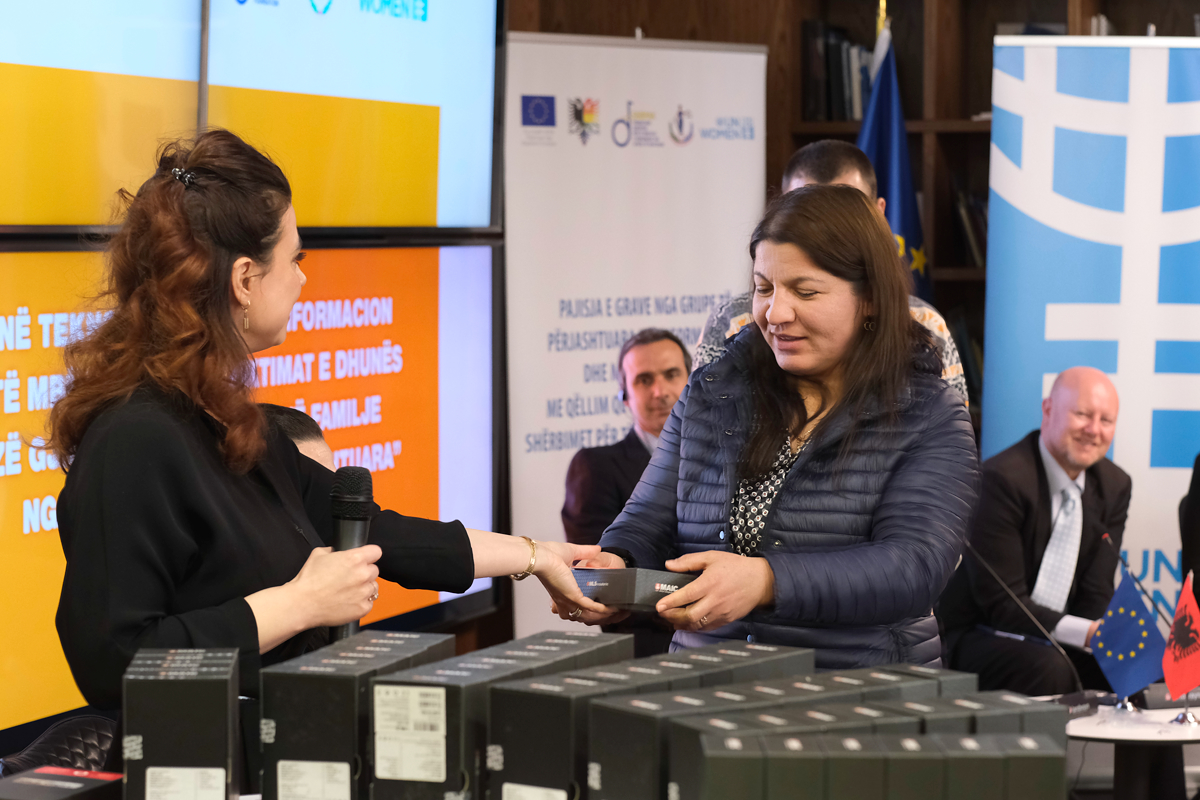Tackling domestic violence through technology in Albania
Date:

Aferdita Kote’s* old Nokia phone had only one contact: that of her husband of 10 years. He called her constantly to know her whereabouts. But she did not tell him when she got a new smartphone equipped with a mobile application (Bright Sky) to report violence. Over the course of two months, she learned how to use it thanks to the Roma Women’s Rights Centre, until one day she finally got up the nerve to use it. The police showed up at her door to find her with bruises on her face.
“I reported domestic violence through the mobile app and the police came to my house immediately. I tried to go to the police station before, but I could not find the courage,” says Kote, a mother of two.
Last year, 70 women from disadvantaged groups in Albania – including women with disabilities, Roma women, and women from the lesbian, gay, bisexual, transgender, intersex and queer (LGBTQI+) community – received smartphones and Internet packages to enable them to report violence and access necessary protection and support services.
“Aferdita learned about this creative solution during one of our information sessions with the community,” explains Manjola Veizi, Executive Director of the Roma Women’s Rights Centre, which is a partner of UN Women’s Regional Programme on Ending Violence against Women in the Western Balkans and Türkiye, funded by the European Union. “She finally used the app to report her abusive partner who has been detained and she has a protection order for one year.”
The Bright Sky application – the result of a partnership between the Vodafone Albania Foundation, Albania’s Ministry of Interior, Ministry of Health and Social Protection and UN Women – was launched in Albania in 2021 through the “Hidh nje H’app” (”Take a st’aap”) campaign. This free app provides support and information to anyone who may be in an abusive relationship or to those concerned about someone they know. It enables users to assess the safety of a relationship, access information about different forms of abuse and how to help a friend that may be affected and locate their nearest support centre.
In March 2022, Vodafone Albania Foundation in collaboration with the Albanian Disability Rights Foundation (ADRF) provided the smartphones equipped with the Bright Sky application to 70 women in five cities: Tiranë, Vlorë, Fier, Lezhë and Korçë. ADRF and its partner organizations, Roma Women’s Rights Center and Aleanca LGBT, supported vulnerable women – in particular Roma women, women with disabilities, and LGBTIQ+ community – through technological literacy training and information on reporting violence, as well as through peer-to-peer support, counselling and legal aid.
“Ten training sessions were held in small groups where women and girls who received the smart phones were introduced not only to the application, but also learned about all forms of violence and about the services available in the areas where they live,” explains Blerta Cani, Executive Director of ADRF.
Since 2021 they have established two self-advocacy groups of women with disabilities and women from the Roma community, who were trained to provide information and support to other women from their communities. More than 200 women survivors of violence have been informed and referred to more specialized services, of whom around 50 have received free legal aid and psychosocial counselling.
“Through the training for the mobile application, I learned for the first time about different forms of violence,” says Qamile Beshiri, one of the women with disabilities to receive a smartphone. “It is truly an innovation for our community to be able to report violence – a phenomenon that women and girls with language impairments experience often, not only from their husbands but also from their family members.” She suggests developing an orientation video about the use of the application in sign language, to further increase reporting from women and girls with disabilities.
Vodafone Albania Foundation, a signatory to the Women Empowerment Principles (WEPs) has conducted campaigns throughout the year to raise public awareness on domestic violence and inform Albanians about the application, which has increased the number of users.
“We organized several training sessions with professionals working to fight against domestic violence, such as representatives of the national mechanism against domestic violence and NGOs. A dedicated session was also held with the School of Magistrates as well as with students of the Faculty of Law and Economics,” says Ermira Kocu, Senior Manager of Corporate Social Responsibility at Vodafone Albania Foundation.
The application has 25,234 users so far and 85 per cent of them have benefited directly.
For her part, Aferdita Kote is now happy, has started working and feels better – albeit not yet safe, since she still lives in her husband’s house. As she awaits housing support, she is scared about what might happen to her and her two children when her husband returns.
Previous research conducted by UN Women and its partners showed that women from vulnerable communities face additional forms of violence and discrimination related to their sexual identity, disability and ethnicity, as well as various challenges in reporting violence in all its forms. This is why it is vital to continue supporting organizations working from an intersectional approach.
* Name changed to protect the identity of the individual.